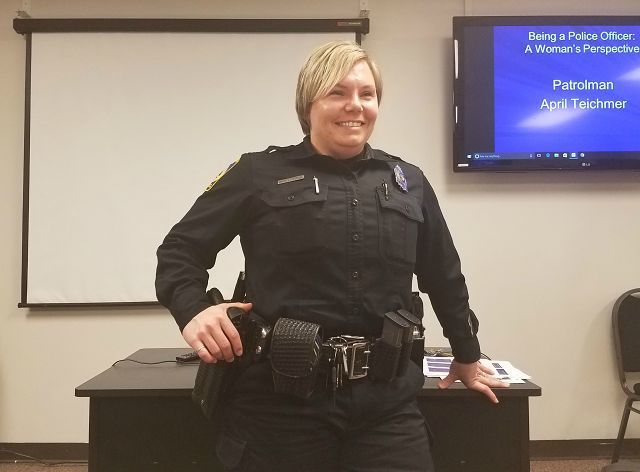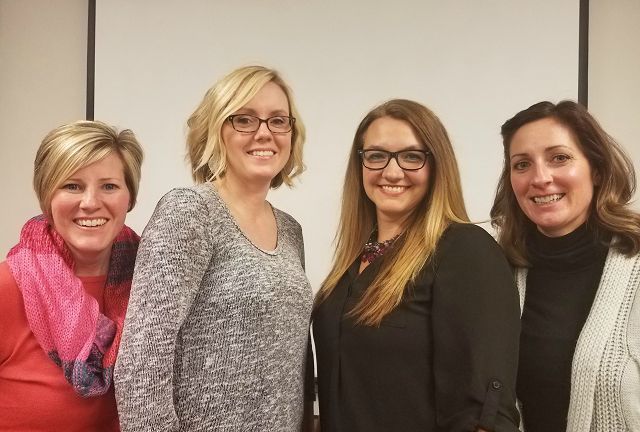Wooster Citizens Police Academy: A womans perspective and the stress of being an officer
The first call we got after she was hired, she was the first one on the pile. Id take her to a fight with me any day, Wooster Police Chief Matthew Fisher said of patrolman April Teichmer at the second class of the Wooster Citizens Police Academy.
Sixteen years ago Teichmer was going for a business degree when she decided that she might like to try being a police officer. She was only two months into the academy when she discovered she was pregnant.
I finished all the requirements runs, sit-ups, push-ups while I was very, very pregnant, Teichmer said.
After working part-time in Shreve, Teichmer decided to apply in Wooster. And low and behold they hired me. It was hard ... having a child. I was on the night shift. Id work 6 p.m. to 6 a.m.
Teichmer was still working the night shift when she became pregnant with her daughter. Working here pregnant is not anything I would recommend, Teichmer said.
The officer and her family have chosen to live in town. Theres good and bad, she said. If you want to vote on things that impact our job, you need to live in town. I hate it when your car gets egged or your garage door gets spray painted.
Teichmer has experienced biases in the field because shes female. We were at a call a few months ago, Teichmer said, and the guy would not talk to me because Im a woman.
Is being a woman a factor when it comes to strength? I deadlift 295 pounds, Teichmer said. A lot of the stuff we deal with doesnt come down to strength. It comes down to talking your way out of things, but the physical fitness factor does come in to play.
Having a mother on the police force makes life different for children. Teichmer explained that when they are out in public, if she encounters anyone she knows from work, she immediately gets her children out of the picture.
My son gets the car key, that way in case anything happens, he can get back to the car and lock it. My kids were the first to get cell phones. There is a certain phrase I tell my kids, and they know to hide.
Currently there are four female officers. Asked about the diversity of the local police force, Fisher said, If you can do the job, Im [gonna] hire you.
Several police officers wives spoke to the class about how their husbands profession affects their home and family life. Beth Fisher described a time her husband took their daughter to the movies.
They always sit in the back with a view of the room ... He noticed someone in the crowd with a backpack who entered the theater breathing heavily and sweating profusely. It turned out the man had simply run to the theater and was out of breath, but it affected the officers ability to watch a movie with his daughter.
Amanda Nedoma said, Being married to a police officer is definitely different. You adapt. Its your new normal ... We were in the grocery store, and I turned around, and hes gone ... running warrants on someone he saw in the store. He said, Just keep going, check out and go to the car. Thats not a normal occurrence for everyone, but for us it is. They are constantly on duty, if its the middle of the night, if its a family dinner.
All the women who spoke had moved out of town with their families in order to feel more secure. They have routines similar to Teichmers for keeping their children safe. They also described everyday things like never having pizza delivered to their home as being business as usual for them.
Carissa Timko said, All this does come with the territory. And Im sure we would all say we love our husbands and wouldnt trade it for anything.
In the same class session Fisher discussed the extreme stress that accompanies the job. Your body only gets assaulted once in a while, but your brain gets assaulted every day. Suicide is a leading cause of death for law enforcement. We see the most gruesome things youve ever considered. My mental Rolodex has images in it I wish I could get out, and I cant. We see these things all the time, and were just supposed to forget about it. Could you? Most people cant.
Fisher described why he is often distrustful of people when in the field. The lens through which we see the world is different. Nobody calls us to come over when everythings going right. We see people at three times: their [baddest], their maddest and their saddest ... Being distrustful of human nature and motive keeps us alive.
When I pull over an older driver who was taught that you get out and go to the officer so they are not inconvenienced, Ive got my gun drawn, my door open and Im screaming, Get back in the car! To a bystander, what does that look like? Thats the way we have to act every day. Its because we want to go home.
The class watched a powerful dash cam video from a small Ohio town. It began as a simple traffic stop until the driver got out of his car with an AK47 and opened fire. There were two officers in the car. One was a rookie in her first week.
Fisher said, The only thing that saved them was that there were two of them ... There is no such thing as a normal day.




